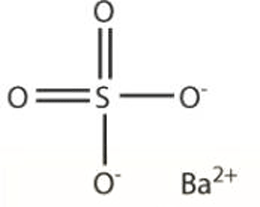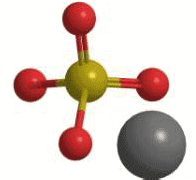

Barium sulfate (BaSO4), also known as barite, is a dense (4.48 g/cm3), insoluble salt that has many uses. Almost all barite (98%) is used as a densifying additive to oil well drilling fluids, or “muds”, which are used to seal the space around the drill bit. The mud also flushes out chippings and cools and lubricates the bit. High-density muds are necessary for drilling into deep formations to counteract high gas pressures. BaSO4 also has multiple uses in X-ray imaging, paint pigments, fireworks, and brake linings.
MOTW update: September 4, 2023
Barium sulfate1 (BaSO4) is also known as barite, the mineral in which it is found, its principal use is as a densifying additive to oil well drilling fluids, or “muds”.
BaSO4 works well in petroleum drilling muds; but it can be problematic for drilling in other reservoirs such as shale oil and gas deposits, where it widely contributes to mineral scaling despite the use of scale inhibitors. In August, Barbara F. Esteves*, Jennifer L. Druhan, and Adam D. Jew at the University of Illinois at Urbana–Champaign and the SLAC National Accelerator Laboratory (Menlo Park, CA) used experimentation and modeling to improve the understanding of the geochemical behavior of BaSO4 accumulation in shale matrices under conditions typical of fracturing operations. Their experiments demonstrated a pH dependence on the rate of BaSO4 precipitation, which they incorporated into a predictive model that they validated on three major shale samples of highly variable mineralogy.
1. CAS Reg. No. 7727-43-7.

Learn more about this molecule from CAS, the most authoritative and comprehensive source for chemical information.
Molecule of the Week needs your suggestions!
If your favorite molecule is not in our archive, please send us a message. The molecule can be notable for its current or historical importance or for any quirky reason. Thank you!
Stay Ahead of the Chemistry Curve
Learn how ACS can help you stay ahead in the world of chemistry.

